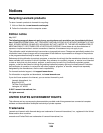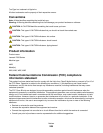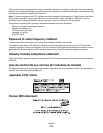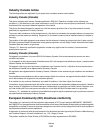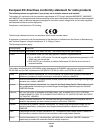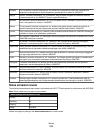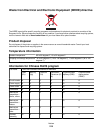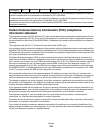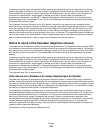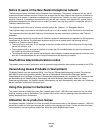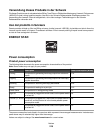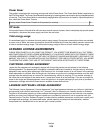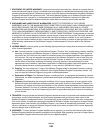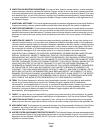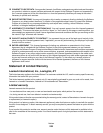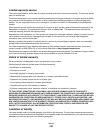Telephone companies report that electrical surges, typically lightning transients, are very destructive to customer
terminal equipment connected to AC power sources. This has been identified as a major nationwide problem. It is
recommended that the customer install an appropriate AC surge arrestor in the AC outlet to which this device is
connected. An appropriate AC surge arrestor is defined as one that is suitably rated, and certified by UL
(Underwriter's Laboratories), another NRTL (Nationally Recognized Testing Laboratory), or a recognized safety
certification body in the country/region of use. This is to avoid damage to the equipment caused by local lightning
strikes and other electrical surges.
The Telephone Consumer Protection Act of 1991 makes it unlawful for any person to use a computer or other
electronic device, including fax machines, to send any message unless said message clearly contains in a margin
at the top or bottom of each transmitted page or on the first page of the transmission, the date and time it is sent
and an identification of the business or other entity, or other individual sending the message, and the telephone
number of the sending machine or such business, other entity, or individual. (The telephone number provided may
not be a 900 number or any other number for which charges exceed local or long-distance transmission charges.)
See your user documentation in order to program this information into your fax machine.
Notice to users of the Canadian telephone network
This product meets the applicable Industry Canada technical specifications. The Ringer Equivalence Number (REN)
is an indication of the maximum number of terminals allowed to be connected to a telephone interface. The terminus
of an interface may consist of any combination of devices, subject only to the requirement that the sum of the RENs
of all the devices does not exceed five. The modem REN is located on the rear of the equipment on the product
labeling.
Telephone companies report that electrical surges, typically lightning transients, are very destructive to customer
terminal equipment connected to AC power sources. This has been identified as a major nationwide problem. It is
recommended that the customer install an appropriate AC surge arrestor in the AC outlet to which this device is
connected. An appropriate AC surge arrestor is defined as one that is suitably rated, and certified by UL
(Underwriter’s Laboratories), another NRTL (Nationally Recognized Testing Laboratory), or a recognized safety
certification body in the country/region of use. This is to avoid damage to the equipment caused by local lightning
strikes and other electrical surges.
This equipment uses CA11A telephone jacks.
Avis réservé aux utilisateurs du réseau téléphonique du Canada
Ce produit est conforme aux spécifications techniques d’Industrie Canada. Le numéro REN (ringer equivalence
number : numéro d’équivalence de sonnerie) fournit une indication du nombre maximum de terminaux pouvant être
connectés à l’interface téléphonique. En bout de ligne, le nombre d’appareils qui peuvent être connectés n’est pas
directement limité, mais la somme des REN de ces appareils ne doit pas dépasser cinq. Le numéro REN du modem
est indiqué sur l’étiquette produit située à l’arrière de l’équipement.
Les compagnies de téléphone constatent que les surtensions électriques, en particulier celles dues à la foudre,
entraînent d'importants dégâts sur les terminaux privés connectés à des sources d’alimentation CA. Il s’agit-là d’un
problème majeur d’échelle nationale. En conséquence, il vous est recommandé de brancher un parasurtenseur
dans la prise de courant à laquelle l’équipement est connecté. Utilisez un parasurtenseur répondant à des
caractéristiques nominales satisfaisantes et certifié par le laboratoire d’assureurs UL (Underwriter’s Laboratories),
un autre laboratoire agréé de type NRTL (Nationally Recognized Testing Laboratory) ou un organisme de
certification agréé dans votre région ou pays. Ceci prévient tout endommagement de l’équipement causé par les
orages et autres surtensions électriques.
Cet équipement utilise des prises de téléphone CA11A.
Notices
216



